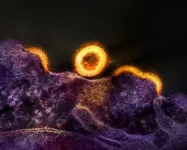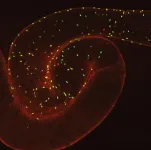(Press-News.org) Prostate cancer is the second leading cause of cancer death among American men.
A ground-breaking study, conducted by researchers from the University of Virginia, Mount Sinai, the University of Michigan, the University of Texas and others, has demonstrated the clinical success of a new nanoparticle-based, laser-guided therapy for prostate cancer treatment.
The study, which involved 44 men with localized prostate cancer, used gold nanoshellss in combination with magnetic resonance imaging (MRI) and ultrasound fusion — an advanced technique that enhances MRI data — to precisely target and eliminate cancerous prostate tissue.
Gold nanoshells are tiny particles, thousands of times smaller than a human hair, that can be engineered to strongly absorb specific wavelengths of light and generate heat. In this case, gold nanoshells were designed to accumulate in the tumors, allowing for highly targeted near-infrared laser treatment that heats and destroys the cancerous tissue while sparing surrounding healthy cells.
This innovative method, called nanoparticle-directed focal photothermal ablation, successfully eliminated cancerous cells in 73% of patients after 12 months, as confirmed by negative biopsies in the treated areas. Importantly, the treatment was able to achieve these results while preserving key functions, including urinary and sexual health, and without observed side effects, marking a significant improvement in the quality of life for patients.
"Our findings represent a major step forward in prostate cancer treatment. This therapy not only effectively eliminates cancerous cells but also preserves key quality-of-life factors, which is a huge win for patients," said Jennifer L. West, Ph.D., Dean of the School of Engineering and Applied Science at the University of Virginia, an author on this paper and inventor of this technology.
"This study showcases the strength of interdisciplinary collaboration,” West continued. “Together, we’re pushing the boundaries of what's possible in cancer treatment, and it's exciting to be at the forefront of this innovation."
This new cancer treatment is being commercialized by Nanospectra Biosciences, Inc., a company co-founded by Dean West.
A Multi-Institutional Study of Magnetic Resonance/Ultrasound Fusion–Guided Nanoparticle-Directed Focal Therapy for Prostate Ablation was published online September 3, 2024, in the Journal of Urology.
About UVA Engineering: As part of the top-ranked, comprehensive University of Virginia, UVA Engineering is one of the nation’s oldest and most respected engineering schools. Our mission is to make the world a better place by creating and disseminating knowledge and by preparing future engineering leaders. Outstanding students and faculty from around the world choose UVA Engineering because of our growing and internationally recognized education and research programs. UVA is the No. 1 public engineering school in the country for the percentage of women graduates, among schools with at least 75 degree earners; among the top engineering schools in the United States for the four-year graduation rate of undergraduate students; and among the top-growing public engineering schools in the country for the rate of Ph.D. enrollment growth. Our research program has grown by 95% since 2016. Learn more at engineering.virginia.edu.
END
Nanoparticle therapy offers new hope for prostate cancer patients
2024-10-16
ELSE PRESS RELEASES FROM THIS DATE:
UVA researchers engineer AI breakthrough in human action detection technology
2024-10-16
What if a security camera could not only capture video but understand what’s happening — distinguishing between routine activities and potentially dangerous behavior in real time? That’s the future being shaped by researchers at the University of Virginia’s School of Engineering and Applied Science with their latest breakthrough: an AI-driven intelligent video analyzer capable of detecting human actions in video footage with unprecedented precision and intelligence.
The system, called the Semantic and Motion-Aware Spatiotemporal Transformer Network (SMAST), promises a wide range of ...
Bolstering the fight against antibiotic-resistant bacteria
2024-10-16
GAINESVILLE, Fla. — University of Florida Health scientists exploring how combinations of antibiotics can fight resistant bacteria have been awarded an $11.8 million grant for work that could help save the tens of thousands of lives lost yearly to infections that are increasingly plaguing humanity.
The National Institutes of Health, or NIH, grant to the UF College of Medicine and the UF College of Pharmacy will support scientists working to uncover the mechanics of how bacteria and antibiotics interact, down to the molecular level.
That mechanistic knowledge ...
Deep learning illuminates atmospheric blocking events of past, future
2024-10-16
Atmospheric blocking events are persistent, high-impact weather patterns that occur when large-scale high-pressure systems become stationary and divert the jet stream and storm tracks for days to weeks, and can be associated with record-breaking flooding or heat waves, such as in Europe in 2023. In a new study, University of Hawai‘i at Mānoa atmospheric scientist Christina Karamperidou used a deep learning model to infer the frequency of blocking events over the past 1,000 years and shed light on how future climate change may impact these significant phenomena.
“This study set out to extract a paleoweather signal from ...
Kidney transplantation among those with HIV infections shown safe and effective
2024-10-16
It is just as safe and effective for people with HIV in need of kidney transplantation to get their organ from donors who are also HIV positive as it is from donors who are not infected with the virus, a new study shows. Survival rates for organ recipients one and three years after the procedure were the same for donors with or without HIV. Also the same were risks of serious side effects, such as infection, fever, and rejection in the donated organ.
In what is the largest comparative trial of the experimental procedures since the first transplant was performed in the United States in 2016, researchers ...
Longer-term data from SWOG S1826 trial confirm nivolumab-AVD benefit in Hodgkin lymphoma
2024-10-16
In mid-2023, the SWOG S1826 phase 3 trial in advanced Hodgkin lymphoma reported highly positive primary results earlier than expected, after the trial’s second planned interim analysis found the preset threshold for efficacy had already been reached.
Now, a follow-up analysis with additional data – a median follow-up of 2.1 years – confirms the durability of those initial findings: among the 970 newly diagnosed adolescents and adults randomized to the trial, those who received a combination of nivolumab plus AVD chemotherapy (N-AVD) had a significantly lower risk of cancer progression ...
In landmark study, immunotherapy boosts survival of advanced Hodgkin lymphoma
2024-10-16
A treatment that rallies the immune system to destroy cancer raised the survival rate for advanced Hodgkin lymphoma patients to a remarkable 92 percent, suggesting a new standard therapy for the disease. The New England Journal of Medicine published the innovative clinical trial results this week.
Young people are most at risk to get Hodgkin lymphoma, an uncommon blood and immune system cancer that falls within the general category of lymphomas. With this new treatment, scientists believe they ...
Kidney transplantation between donors and recipients with HIV is safe
2024-10-16
WHAT:
Kidney transplantation from deceased donors with HIV (HIV D+) to recipients with HIV (HIV R+) was safe and comparable to kidney transplantation from donors without HIV (HIV D-) in a multicenter observational study in the United States. The clinical outcomes observed were consistent with smaller pilot studies, but this National Institutes of Health (NIH)-funded clinical trial was the first statistically powered to demonstrate noninferiority, which means that an approach being studied is as good as standard clinical practice. The results were published today ...
Brown researchers show how gut hormones control aging in flies and how it relates to human biology
2024-10-16
PROVIDENCE, R.I. [Brown University] — Biologists at Brown University have discovered how a neuropeptide hormone made in the gut of flies can control their lifespan.
The findings, published in PNAS, have implications for humans, too, the researchers say — especially as new diabetes and obesity medications based on gut hormones in the same family of the fly hormone are becoming more widespread.
For the past two decades, study author Marc Tatar, a professor of biology affiliated with the Center on the Biology of Aging at Brown University, has studied how the hormones insulin and insulin-like ...
Which clot-busting drug is tied to better recovery after stroke?
2024-10-16
EMBARGOED FOR RELEASE UNTIL 4 P.M. ET, WEDNESDAY, OCTOBER 16, 2024
MINNEAPOLIS – For people with ischemic stroke, treatment with the clot-busting drug tenecteplase is associated with a slightly higher likelihood of an excellent recovery and reduced disability three months later than the drug alteplase, according to a meta-analysis published in the October 16, 2024, online issue of Neurology®, the medical journal of the American Academy of Neurology. Researchers found that the likelihood of good recovery was similar ...
Study: breast cancer drug shows potential for rare appendix cancer
2024-10-16
Researchers at University of California San Diego School of Medicine found an FDA-approved drug used to treat breast cancer has the potential to be an effective therapeutic for a specific type of appendix cancer.
The clinical trial results, publishing in the October 16, 2024 online edition of the Journal of Clinical Oncology, showed the oral medication, known as palbociclib, stabilized tumor growth and reduced blood tumor marker levels in patients with peritoneal mucinous carcinomatosis (PMC). This form of cancer originates in the appendix and is often resistant to standard chemotherapy.
“Finding that a breast cancer drug is ...






